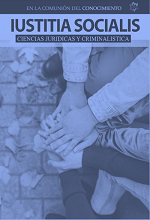Mediation as an alternative means of conflict resolution
DOI:
https://doi.org/10.35381/racji.v5i3.1099Keywords:
Mediation, administration of justice, legal procedure.Abstract
The objective of the investigation was to analyze mediation as an alternative means of conflict resolution in Ecuador. It was methodologically based on a descriptive documentary type with bibliographic design. It is evident that excessive judicial bureaucracy leads to cases of corruption, distortion of the application of the fundamental rights of vulnerable social groups, requiring a restorative justice of the ethical principles of human coexistence. The number of processes that enter the Mediation Center in the province of Pastaza is from thirty to fifty cases, however, it is a low number for the number of cases that are processed through traditional justice, in addition to the mediation acts that are not have complied with the agreed agreements, their breach will be demanded.
Downloads
References
Código de la Niñez y Adolescencia. Ley No. 2002-100. Recuperado de https://n9.cl/fokqg
Código del trabajo. Registro Oficial Suplemento 167 de 16-dic-2005. Última modificación: 26-sep-2012. Recuperado de https://n9.cl/z3p5n
Código Orgánico Integral Penal. Suplemento -- Registro Oficial Nº 180 -- Lunes 10 de febrero de 2014. Recuperado de https://n9.cl/g6sc
Constitución de la República del Ecuador (2008). Sección octava Medios alternativos de solución de conflictos. Recuperado de https://n9.cl/rp6p
Entelman, R. (2005). Teoria del conflicto . Barcelona España: Gedisa S.A.
Gorjón-Gómez, G, & Sauceda-Villeda, B. (2018). Justicia restaurativa, una herramienta de paz en la resolución de conflictos comunitarios. Caso Nuevo León. [Restorative justice, a tool of peace in the resolution of community conflicts. Nuevo León case]. Política criminal, 13(25), 548-571. https://dx.doi.org/10.4067/S0718-33992018000100548
Jarama-Castillo, Z, Vásquez-Chávez, J, & Durán-Ocampo, A. (2019). El principio de celeridad en el código orgánico general de procesos, consecuencias en la audiencia. [The principle of celerity in the general organic code of processes, consequences in the audience]. Revista Universidad y Sociedad, 11(1), 314-323.
Jequier-Lehuedé, E. (2016). La mediación como alternativa de solución de los conflictos empresariales en Chile: Razones y mecanismos para su regulación. [The mediation like an alternative for the solution of enterprise conflicts in Chile. Reasons and mechanisms for his regulation]. Revista de derecho (Valdivia), 29(1), 91-118. https://dx.doi.org/10.4067/S0718-09502016000100005
Leal, A. (2006). Burocracia, justicia y pluralismo jurídico. Una exploración de los espacios del poder en Oaxaca. [Bureaucracy, justice and legal pluralism: an exploration concerning spaces of power in Oaxaca]. Alteridades, 16(31), 39-48.
Mazo-Álvarez, H. M. (2014). La mediación como herramienta de la justicia restaurativa. [Mediation as a tool for restorative justice]. Opinión Jurídica, 12(23).
Rodrígues, C. (2017). La Mediación. ¿Una respuesta al nuevo paradigma del Derecho? [Mediation. An answer to the new paradigm of Law?]. Revista de Derecho (Universidad Católica Dámaso A. Larrañaga, Facultad de Derecho), (15), 243-256. https://dx.doi.org/10.22235/rd.v1i15.1382
Serrano-Lucero, C. (2016). Justicia restaurativa: la desatinada prohibición de la mediación penal en los asuntos de violencia de género. [Restorative Justice: The Foolish Ban on Criminal Mediation in Gender Violence Matters]. CAPJuridica, 1(1), 147-178.
Vázquez-Martínez, A, & Bazán-Mayagoitia, N. (2019). Justicia restaurativa y reintegración social: retos procedimentales y estructurales. [Restorative Justice and Social Reintegration: Procedural and Structural Challenges]. URVIO Revista Latinoamericana de Estudios de Seguridad, (24), 98-113. https://doi.org/10.17141/urvio.24.2019.3789
Published
How to Cite
Issue
Section
License
CC BY-NC-SA : Esta licencia permite a los reutilizadores distribuir, remezclar, adaptar y construir sobre el material en cualquier medio o formato solo con fines no comerciales, y solo siempre y cuando se dé la atribución al creador. Si remezcla, adapta o construye sobre el material, debe licenciar el material modificado bajo términos idénticos.
OAI-PMH URL: https://fundacionkoinonia.com.ve/ojs/index.php/Iustitia_Socialis/oai










